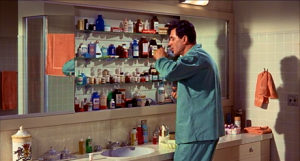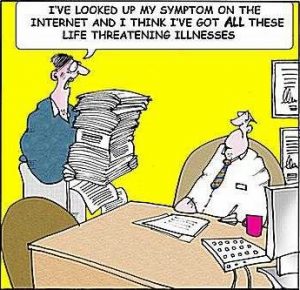Are you a hypochondriac?
 There are some people who love to fall ill; they are obsessed with their health. Even after a physician evaluates this health obsessed people doubt the physician’s reassurance that nothing is wrong with their health. They keep collecting information from books, journals, Internet, newspapers on a variety of ailments, and keep tallying their health conditions with those ailments. The online forums are making the matter worst and they are in hundreds and thousands in number and the number keeps rising. People chat on these forums regarding their ailments and symptoms, which encourage them, indulging in self-medication, and also end up arguing with doctors upon being told that their ailment is not even close to the serious diseases they had imagined. In fact a lot of physicians feel these forums are spoiling the medical scene and only giving rise to hypochondriacs.
There are some people who love to fall ill; they are obsessed with their health. Even after a physician evaluates this health obsessed people doubt the physician’s reassurance that nothing is wrong with their health. They keep collecting information from books, journals, Internet, newspapers on a variety of ailments, and keep tallying their health conditions with those ailments. The online forums are making the matter worst and they are in hundreds and thousands in number and the number keeps rising. People chat on these forums regarding their ailments and symptoms, which encourage them, indulging in self-medication, and also end up arguing with doctors upon being told that their ailment is not even close to the serious diseases they had imagined. In fact a lot of physicians feel these forums are spoiling the medical scene and only giving rise to hypochondriacs.
Some common symptoms to find a hypochondriac are:
- He/she likes to visit many doctors; he/she enjoys doing doctor shopping.
- The person is terribly concerned about some part of body.
- The person keeps searching for a doctor who will agree that he/she is unwell.
- The person is always anxious, nervous or depressed.
- Distrust of medical exams.
- Strained social relationship.
Hypochondriacs are a bunch of complex people and they require multilevel treatment and therapy. It is termed as DSM III, the internationally recognized classification used by psychiatrists. It is defined as “an unrealistic interpretation of one’s bodily sensations as abnormal, leading to the fear and belief that one has a serious disease”. Hypochondriacs get unduly alarmed about most minor symptoms and they convince themselves that they have, or are about to be diagnosed with, a serious illness. For example, a hypochondriac person is sure that his or her headaches are caused by a brain tumor; or somebody with indigestions having burning sensation is sure that he has a heart ailment. The symptoms associated with hypochondrias are not under the person’s intended control. They cause great distress to their family members and friends.
 You should watch a lovely comedy named ‘Send me no flowers’ a movie of 1964, starring Rock Hudson and Doris Day. Handsome Rock Hudson has played a lovable hypochondriac George Kimball in the movie.
You should watch a lovely comedy named ‘Send me no flowers’ a movie of 1964, starring Rock Hudson and Doris Day. Handsome Rock Hudson has played a lovable hypochondriac George Kimball in the movie.
Also, a 1979 Bollywood comedy ‘Meri Biwi ki Shaadi’ starring Amol Palekar and Rajita Kaur shows discouragingly timid hypochondriac Bhagwant (protagonist played by Amol Palekar) checking into the hospital for a checkup; he overhears his doctor discussing the diagnosis of another terminally ill patient with an associate. The hypochondriac Amol Palekar assumes he is the one scheduled to die, he overreacts so much that he asks his friend to help him find a new husband for his beautiful wife. I don’t know if it is a coincidence that the movie is a ditto copy of ‘Send me no flowers’ both stories are same.
It is very difficult to stay with hypochondriacs. In my opinion, things get even tougher for a person living with hypochondriac because most of the times they are misunderstood as attention seekers and crave for pity. Hypochondriacs are not well-understood by the rest of society. It is a mental illness, but because it is an invisible sickness, it can’t be diagnosed by tests or things that can actually prove a person has it. Only psychologists can counsel and diagnose a person with hypochondria. The fear of death is so deeply ingrained in a person suffering from this illness, that it becomes impossible for them to just tell themselves that each sign is their imagination and nothing serious. They get so overwhelmed of an impending doom, as though they are actually dying.
 Do you know that Charles Darwin – the naturalist and Geologist who was fondly called ‘Charlie’ was a adorable neurotic hypochondriac who loved treatments like “water cures” for his perceived ailments, where he would take a cold bath and be wrapped in wet sheets? The famous scientist also kept meticulous records of his own flatulence. It seems Hitler who attempted to wipe out an entire race of people himself suffered from hypochondria. He was throughout his life worried with the state of his health. He was obsessed with his health so much though he was healthy physically. Mentally he was devilish and obsessive. The dictator was prescribed various medicines for all kinds of imagined ailments such as mood swings, Parkinson’s disease, gastro-intestinal issues and skin problems. Often he gave no real reasons at all behind wanting the medication.
Do you know that Charles Darwin – the naturalist and Geologist who was fondly called ‘Charlie’ was a adorable neurotic hypochondriac who loved treatments like “water cures” for his perceived ailments, where he would take a cold bath and be wrapped in wet sheets? The famous scientist also kept meticulous records of his own flatulence. It seems Hitler who attempted to wipe out an entire race of people himself suffered from hypochondria. He was throughout his life worried with the state of his health. He was obsessed with his health so much though he was healthy physically. Mentally he was devilish and obsessive. The dictator was prescribed various medicines for all kinds of imagined ailments such as mood swings, Parkinson’s disease, gastro-intestinal issues and skin problems. Often he gave no real reasons at all behind wanting the medication.
It might sound shocking but it’s mentioned in few records that Florence Nightingale who was the reformer of modern nursing was herself a hypochondriac.
A recent survey revealed that doctors have been struggling to deal with patients who use the internet to find out what ails them. The doctors, including specialists and super specialists, say that people’s increasing dependence on the internet to find medical cures and search for symptoms is disturbingly increasing and this is causing strained doctor-patient relationship. People are overloaded with information which causes a lot of stress in them and they are in fact grossly misinformed. A woman in her 30s was convinced she was suffering from lung cancer. She had been coughing persistently, and obviously the internet search said it was the most basic symptom of lung cancer. She assumed the worst, but it turned out to be a very minor infection.
 So friends, are you one of those who googles a small lump or a bump on body, slight change in urine color, headache, hair fall, dryness in throat or any small changes. Do you imagine suffering from an ailment only because you have read about it on the internet? Do you indulge in self-medication? Do you get anxious about your health often? Do you like visiting doctors every now and then? Do you keep cribbing about your health when you meet friends? If your answer is ‘yes’ then don’t let yourself be at the mercy of your fears because your work, personal relationships, and other aspects of your life will soon suffer. The effects of hypochondria on your life can be as bad as any serious illness out there. The illness you’re looking for may be in your mind rather than in your body. Deal with your condition head-on, simply confront your fears, and get rid of your hypochondria for good. Don’t hold back your emotions cause your deeper emotions manifest as fear of death; be active by going out often for movies, shopping etc, plan a vacation, visit some of your friends in other cities. And, most importantly believe your doctor because he/she still knows medicine better than you do. Your doctor’s expertise on this area is gained from long years of tough education and practice.
So friends, are you one of those who googles a small lump or a bump on body, slight change in urine color, headache, hair fall, dryness in throat or any small changes. Do you imagine suffering from an ailment only because you have read about it on the internet? Do you indulge in self-medication? Do you get anxious about your health often? Do you like visiting doctors every now and then? Do you keep cribbing about your health when you meet friends? If your answer is ‘yes’ then don’t let yourself be at the mercy of your fears because your work, personal relationships, and other aspects of your life will soon suffer. The effects of hypochondria on your life can be as bad as any serious illness out there. The illness you’re looking for may be in your mind rather than in your body. Deal with your condition head-on, simply confront your fears, and get rid of your hypochondria for good. Don’t hold back your emotions cause your deeper emotions manifest as fear of death; be active by going out often for movies, shopping etc, plan a vacation, visit some of your friends in other cities. And, most importantly believe your doctor because he/she still knows medicine better than you do. Your doctor’s expertise on this area is gained from long years of tough education and practice.












































